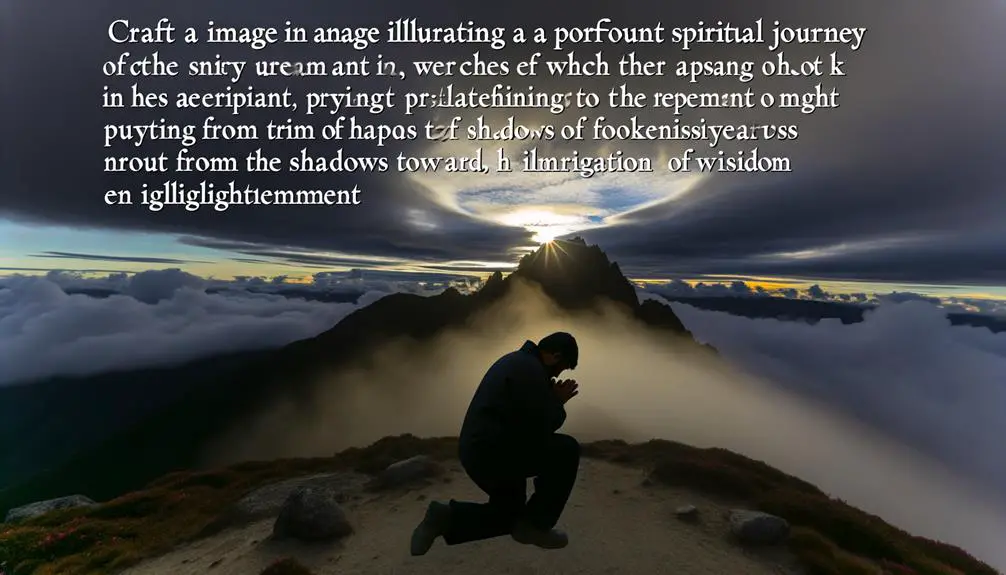Biblical foolishness isn't just ignorance, but a deep moral misstep—discover how this ancient wisdom can guide modern lives.

What Does Foolish Mean in the Bible
Navigating the concept of foolishness in the Bible is like walking through a densely woven tapestry, where every thread is imbued with lessons and warnings.
You'll find that the Bible doesn't merely equate foolishness with a lack of intelligence, but rather paints it as a moral failing, a deliberate turning away from wisdom and divine guidance.
This distinction between mere ignorance and willful folly is crucial, as it shapes the biblical narrative on how one should live a righteous life.
As you explore this topic, consider how the ancient wisdom found in these texts might still hold profound relevance in today's world, especially when it comes to distinguishing between simple mistakes and the true folly of ignoring wisdom's call.
Key Takeaways
- Foolishness in the Bible is a moral misalignment and deliberate refusal of divine guidance.
- Biblical foolishness portrays a heart's condition that resists enlightenment and wisdom.
- The consequences of foolish behavior include personal downfall, damaged relationships, and societal harm.
- Wisdom, as the counter to foolishness, involves moral understanding, humility, and adherence to God's commands.
Biblical Definitions of Foolishness

Exploring the biblical definitions of foolishness reveals a nuanced understanding that encompasses more than mere lack of wisdom. In the scriptures, foolishness isn't simply the absence of intellectual acuity; it's portrayed as a deeper, more profound misalignment. You'll find that foolish hearts aren't just unlearned, but they're often described as hardened against wisdom, resistant to knowledge that could enlighten or redirect their paths. This isn't an ignorance that can be easily remedied by education or exposure to facts; it's a willful rejection of wisdom's guidance, making it wisdom's counterfeit.
This counterfeit nature of foolishness is significant because it implies an active choice rather than a passive state of being. You're not foolish because you don't know something; you're foolish because you've chosen a path that veers away from wisdom even when you've had the chance to embrace it. The biblical texts often juxtapose the foolish and the wise, not just to highlight the right path but to underscore the tragic nature of choosing foolishness. It's a deliberate turning away from insight and understanding, which in turn leads to a life marked by the consequences of such choices.
Understanding this, you see that the biblical concept of foolishness is deeply tied to the condition of the heart and the decisions it makes. It's not merely an intellectual failing but a moral and spiritual one, where the heart becomes the battleground between wisdom and its counterfeit. This perspective shifts the conversation from one of mere knowledge acquisition to one of heart orientation and the choices one makes in response to divine wisdom.
Foolishness as Moral Failing

In the biblical context, foolishness is often seen as a moral failing that reflects a deliberate refusal to adhere to divine guidance and wisdom. This perspective isn't merely about lacking knowledge or making mistakes; it's about a conscious choice to ignore what's considered morally and spiritually right. Such folly is depicted as leading individuals away from a path of righteousness, causing harm to themselves and others in the process. This viewpoint underscores the value placed on wisdom and understanding as foundational to a morally upright life.
The modern implications of this interpretation are significant. In today's world, where moral relativism often challenges absolute truths, the biblical notion of foolishness invites a reevaluation of how wisdom and morality are intertwined. It suggests that wisdom isn't just about intellectual achievement or practical skills but involves a deep ethical and spiritual dimension.
Cultural comparisons further illuminate this concept. While Western societies may emphasize individualism and subjective interpretations of morality, many Eastern traditions stress communal harmony and adherence to ancient wisdom. The biblical stance on foolishness as a moral failing finds echoes in cultures that prioritize collective well-being and moral integrity over personal desires or skepticism towards traditional values.
Understanding foolishness as a moral failing in the Bible thus provides a lens through which to examine contemporary ethical dilemmas and cultural differences. It challenges individuals to consider the role of divine wisdom in guiding moral choices, offering a counterpoint to modern tendencies towards moral ambiguity and relativism.
The Wise Vs. the Foolish

In exploring the dichotomy between the wise and the foolish within biblical texts, you'll encounter distinct definitions and characteristics that set them apart.
You'll understand that biblical wisdom encompasses more than mere knowledge; it's a reflection of one's relationship with God and adherence to His commands.
Conversely, the traits of fools are often illustrated through their rejection of divine wisdom and the consequences that follow.
Defining Biblical Wisdom
The biblical contrast between wisdom and folly hinges on one's ability to adhere to God's commandments and to discern moral paths. Central to this discourse is Solomon's legacy, which is deeply embedded within wisdom literature.
You'll find that wisdom, in this context, isn't merely intellectual capacity but encompasses a profound moral understanding and the application of divine principles in daily living. It's about aligning one's life with God's will, demonstrating prudence, justice, and humility.
Wisdom literature, thus, serves as a guide, offering insights into living a life that reflects divine truth and shuns folly. This distinction underscores a fundamental biblical theme: the wise person builds their life on the foundation of God's truth, while the foolish ignore such guidance, leading their lives astray.
Characteristics of Fools
Fools, as depicted in biblical narratives, often exhibit a stark disregard for divine wisdom, choosing paths that lead away from moral and spiritual enlightenment. This behavior isn't merely a lack of knowledge but a deliberate rejection of wisdom.
The fool's pride, a key characteristic, blinds them to their own faults and the value of wisdom. They're marked by emotional impulsivity, reacting without considering the consequences or the wisdom of restraint. Their decisions aren't rooted in an understanding or respect for divine principles but in immediate gratification or personal gain.
This contrast starkly with the wise, who seek understanding and align their actions with a higher moral and spiritual framework, demonstrating humility and self-control.
Wisdom's Path Revealed
Wisdom's path, contrasting sharply with the fool's journey, beckons you towards a life enriched by understanding and moral integrity. Modern interpretations of this biblical dichotomy highlight its relevance in contemporary societal applications.
Where the foolish reject advice and lean into folly, the wise embrace correction and seek knowledge. This wisdom isn't merely about personal gain but extends to how you interact within society, promoting a culture of insight and thoughtful decision-making.
The Bible's counsel, thus, isn't antiquated but profoundly applicable today. It encourages you to weigh your actions and their impacts, advocating for a life led by wisdom that not only benefits the individual but also strengthens the community.
This path, marked by prudence and discernment, is as vital now as it ever was.
Consequences of Foolish Behavior

In biblical texts, engaging in foolish behavior often results in severe, sometimes divine, repercussions that can affect both the individual and their community. This principle, deeply rooted in ancient wisdom, continues to have relevance today, highlighting the timeless nature of biblical teachings. As you delve deeper into the consequences of folly, it's crucial to understand how these ancient lessons translate into modern consequences and societal impact.
Foolish actions, characterized by a disregard for wisdom and moral boundaries, can lead to personal downfall and communal strife. In a contemporary context, this might manifest as damaged relationships, lost opportunities, or even legal repercussions, reflecting the societal impact of individual choices. The biblical narrative often frames such outcomes as a natural result of straying from a path of wisdom and righteousness, suggesting that the consequences aren't arbitrary but rather a direct outcome of one's actions.
Analyzing these texts, you'll find that the repercussions of foolish behavior serve as cautionary tales, urging individuals to reflect on their actions and their potential impact on others. This perspective encourages a proactive approach to avoiding folly by valuing wisdom, understanding, and community well-being. The emphasis on the ripple effects of one's actions underscores the interconnectedness of individual behavior and societal health.
Thus, the biblical admonitions against foolishness aren't merely moralistic warnings but also practical advice for sustaining personal integrity and societal harmony. They invite a deeper reflection on how personal choices influence broader communal outcomes, highlighting the enduring wisdom contained within these ancient texts.
Parables of Foolishness

You'll find that the Bible employs parables of foolishness, such as the Foolish Builders' Tale, the Wise vs Foolish Virgins, and the Rich Fool Parable, to impart moral lessons.
These narratives serve as a mirror to society, reflecting the consequences of folly versus the rewards of wisdom.
They encourage readers to evaluate their choices and the foundations upon which they build their lives.
Foolish Builders' Tale
Parables of foolishness, notably the tale of the Foolish Builders, offer profound insights into the consequences of neglecting wisdom and discernment in one's choices. This narrative utilizes sand foundations and weather metaphors to illustrate the peril of building one's life on unstable, transient values rather than on enduring principles.
- Sand foundations symbolize the shaky ground of superficial beliefs.
- Weather metaphors depict life's unpredictable challenges.
- The contrast between wise and foolish actions underscores the importance of foresight.
- The parable serves as a caution against complacency and shortsightedness.
- It invites reflection on the foundational values that guide one's decisions and actions.
Analyzing this parable encourages a deeper consideration of the virtues that constitute a well-built, resilient life.
Wise Vs Foolish Virgins
The parable of the Wise and Foolish Virgins offers a critical examination of preparedness and the consequences of neglect in spiritual vigilance. Through this narrative, you're invited to explore the depths of virgin readiness, which metaphorically underscores the importance of being spiritually alert and prepared for the unforeseen.
The lamp symbolism, intricately woven into the fabric of the story, shines a light on the necessity of maintaining one's faith with diligence and foresight. As the wise virgins ensure their lamps are sufficiently fueled, they epitomize prudence and foresight.
Conversely, the foolish virgins, caught in unpreparedness, symbolize the peril of spiritual complacency. This parable, therefore, serves as a sobering reminder of the value of preparedness in the face of inevitable uncertainty.
Rich Fool Parable
In exploring the Rich Fool Parable, one encounters a profound critique of materialism and a stark warning against placing wealth above spiritual well-being. This parable delves into the folly of equating life's value with the abundance of possessions.
- Historical context: Illuminates the societal norms and economic structures of the time.
- Economic implications: Challenges the pursuit of wealth for its own sake.
- Spiritual prioritization: Advocates for valuing spiritual riches over material wealth.
- Mortality awareness: Reminds that life is transient and possessions can't be taken beyond.
- Ethical living: Encourages a life of generosity and mindfulness towards others' needs.
Analyzing this parable, you're invited to reflect on the balance between material success and spiritual fulfillment, within its historical and economic framework.
Repentance From Foolishness

Turning away from foolishness, scripture emphasizes the importance of acknowledging one's missteps and seeking divine forgiveness. This process, often seen as a graceful recovery, is pivotal for spiritual growth and renewal. The Bible doesn't mince words when it addresses the consequences of foolish pride, presenting it as a significant barrier to repentance. It's this recognition of fallibility that marks the first step towards rectification and ultimately, redemption.
The path from foolishness to enlightenment isn't merely about recognizing one's folly but also about the genuine desire to amend one's ways. The scriptures delineate a clear distinction between mere acknowledgment of foolish behavior and a heartfelt repentance that paves the way for a transformative journey. This journey, underscored by a humble acceptance of one's limitations and a sincere appeal for divine guidance, showcases the profound impact of repentance on an individual's spiritual life.
Moreover, the act of repentance from foolishness is portrayed not as a momentary lapse but as a conscious, ongoing decision to eschew former patterns of behavior that led to spiritual downfall. It involves an active disavowal of the arrogance and self-reliance that often characterize foolish pride, embracing instead a life marked by humility and dependence on divine wisdom.
In essence, the biblical narrative on repentance from foolishness serves as a compelling admonition against the perils of hubris and a clarion call to seek redemption through a sincere and humble heart. It's a testament to the transformative power of acknowledging one's foolishness and earnestly seeking to rectify it through divine grace.
Gaining Wisdom From Folly

Gaining wisdom from folly, a journey often paved with humility and introspection, requires you to critically evaluate past errors as stepping stones for growth and enlightenment. This transformative process often involves shedding layers of foolish pride and embracing the learning curve that life presents. Through biblical narratives, it's evident that wisdom isn't merely the accumulation of knowledge but the application of understanding and humility gained through experiences, including those marked by foolishness.
Here are five key insights to help you navigate from folly to wisdom:
- Self-awareness: Recognize and accept your limitations and mistakes. This fundamental step allows you to move beyond foolish pride and start the journey toward wisdom.
- Humility: Humility is the antidote to pride. It opens your heart and mind to learning from your errors and the wisdom of others.
- Reflection: Take time to reflect on your actions and their outcomes. This introspective practice can reveal the root causes of your foolishness and guide you toward better decisions.
- Seek guidance: Look to the teachings and examples found in the Bible, mentors, and wise individuals in your community. Their insights can illuminate your path and help you avoid repeating mistakes.
- Patience: Understand that gaining wisdom is a lifelong process. Each mistake on your learning curve offers a unique opportunity for growth and improvement.
Embracing these practices won't only help you navigate the transition from folly to wisdom but will also enrich your spiritual journey, making you a more insightful, compassionate, and resilient individual.
Frequently Asked Questions
How Does the Concept of Foolishness in the Bible Compare to Its Understanding in Other Ancient Texts Outside of Judeo-Christian Traditions?
When you explore foolishness definitions and make ancient comparisons, you'll find that the concept of foolishness varies widely.
Unlike the strict moral and wisdom-based perspective in Judeo-Christian texts, other ancient traditions often view foolishness through cultural, philosophical, and sometimes humorous lenses.
These differences highlight a broader spectrum of understanding human behavior and morality, demonstrating that what's considered foolish can deeply depend on the societal and cultural context it's examined within.
Are There Any Cultural Practices or Celebrations That Have Been Influenced by the Biblical Interpretation of Foolishness?
You're exploring a fascinating landscape where cultural reinterpretations of biblical concepts dance in public squares. Foolish festivals, such as April Fool's Day, serve as prime examples. These events aren't just about light-hearted pranks; they're deeply rooted in the biblical interpretation of foolishness, yet transformed into communal joy.
At their core, they challenge and reflect on wisdom and folly, bridging ancient texts with contemporary celebrations through a lens of playful scrutiny.
How Have Different Translations of the Bible Impacted the Meaning and Perception of Foolishness as Described in the Original Texts?
Different translations of the Bible have significantly altered the perception of foolishness due to varying translation methodologies and the linguistic evolution over time.
You'll find that these translations can either dilute or intensify the original texts' meaning.
Analyzing these differences, you're essentially exploring how scholars' interpretative choices and the natural progression of language affect our understanding of biblical concepts, making the study of foolishness in the Bible a complex and nuanced field.
Can the Concept of Foolishness in the Bible Be Reconciled With Modern Psychological Understandings of Decision-Making and Cognitive Biases?
You're navigating the complex terrain where ancient wisdom meets cutting-edge science. Indeed, the biblical idea of foolishness can harmonize with modern psychological insights into decision-making and cognitive biases.
By integrating neuroscience perspectives and principles of behavioral economics, you'll find that ancient texts and modern science often speak the same language of human behavior.
This analytical journey reveals that wisdom and folly aren't bound by time, transcending centuries through shared human experiences.
How Has the Portrayal of Foolishness in the Bible Influenced Contemporary Language and Idioms Related to Intelligence and Wisdom?
You're exploring how the Bible's depiction of foolishness has shaped modern expressions and insights into intelligence and wisdom. This journey reveals a fascinating idiomatic evolution, where 'foolish wisdom' often highlights the paradox of knowing.
Conclusion
In conclusion, you've navigated the biblical landscape where foolishness isn't merely an absence of knowledge but a profound moral failing. Like a ship adrift without a compass, the fool meanders through life, oblivious to the wisdom that anchors.
Yet, this journey through scripture illuminates a path from folly to enlightenment, emphasizing that true wisdom is often forged in the fires of our mistakes. By embracing repentance and seeking divine guidance, you can chart a course towards a more insightful existence.



Sign up